Executive Functioning Skills: Lifespan Development and Activity Report
VerifiedAdded on 2021/02/19
|6
|1418
|73
Report
AI Summary
This report delves into the realm of executive functioning, which encompasses critical cognitive processes like working memory, inhibitory control, and cognitive flexibility. It explores the development of these skills across the lifespan, from infancy and childhood to adolescence and adulthood, highlighting how these functions evolve and influence behavior at different stages. The report then focuses on creating an activity, specifically a memory game called "What's Missing," designed to enhance working memory in early childhood. It also considers modifications to the activity for children with learning disabilities, suggesting the use of Robomemo to aid in memory retention. The report concludes by emphasizing the significance of understanding and nurturing executive functioning throughout life, and the importance of adapting activities to accommodate individuals with specific cognitive challenges. The report references several academic sources to support its analysis.
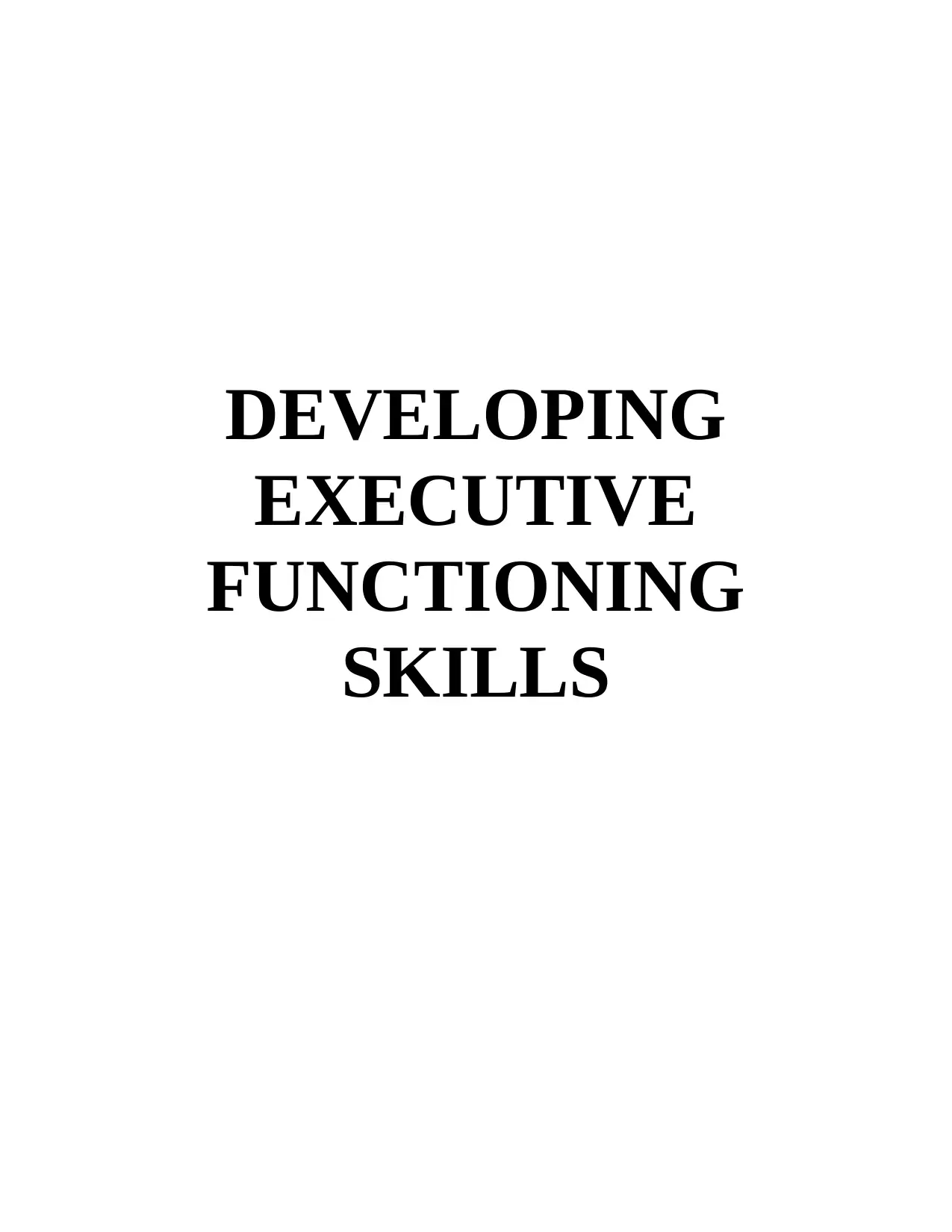
DEVELOPING
EXECUTIVE
FUNCTIONING
SKILLS
EXECUTIVE
FUNCTIONING
SKILLS
Paraphrase This Document
Need a fresh take? Get an instant paraphrase of this document with our AI Paraphraser
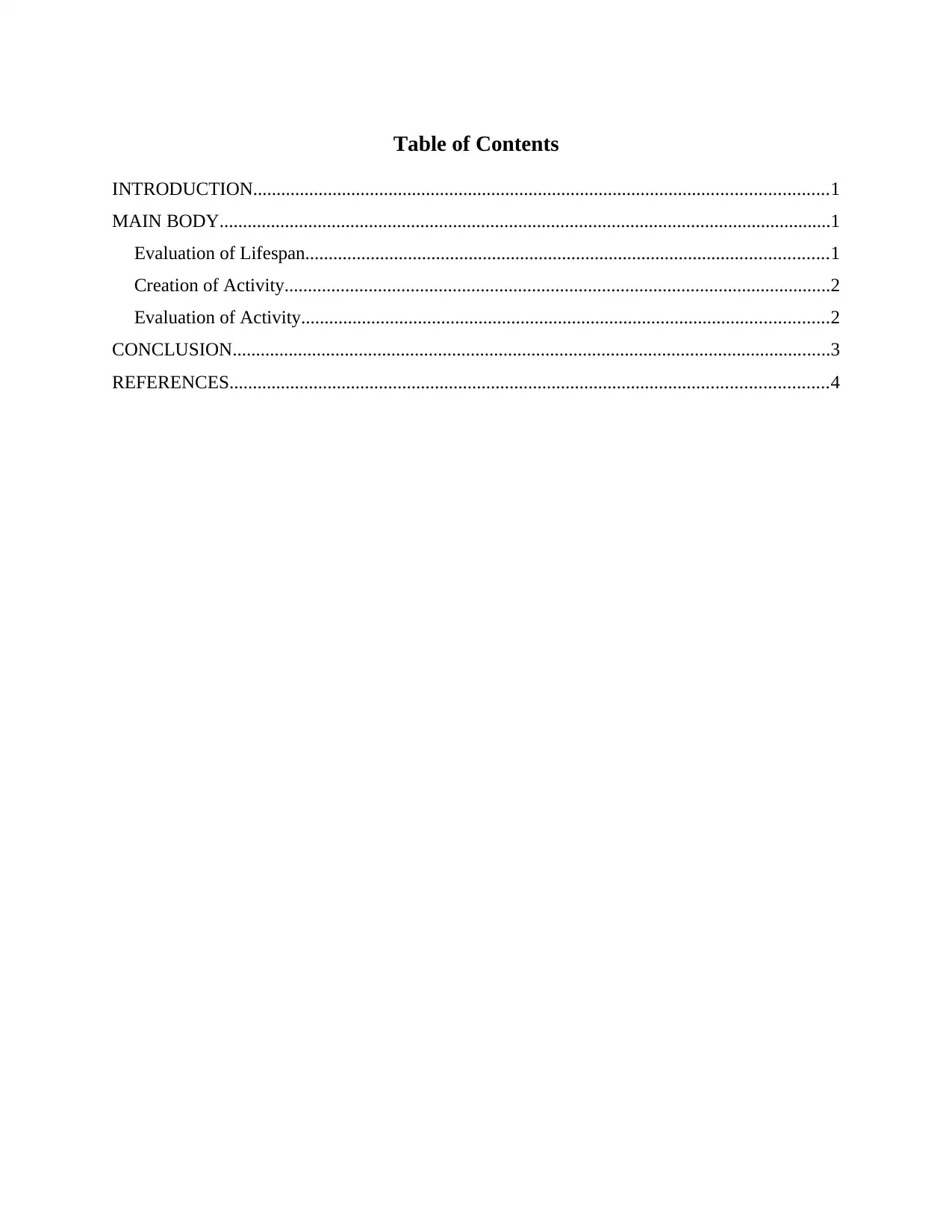
Table of Contents
INTRODUCTION...........................................................................................................................1
MAIN BODY...................................................................................................................................1
Evaluation of Lifespan................................................................................................................1
Creation of Activity.....................................................................................................................2
Evaluation of Activity.................................................................................................................2
CONCLUSION................................................................................................................................3
REFERENCES................................................................................................................................4
INTRODUCTION...........................................................................................................................1
MAIN BODY...................................................................................................................................1
Evaluation of Lifespan................................................................................................................1
Creation of Activity.....................................................................................................................2
Evaluation of Activity.................................................................................................................2
CONCLUSION................................................................................................................................3
REFERENCES................................................................................................................................4
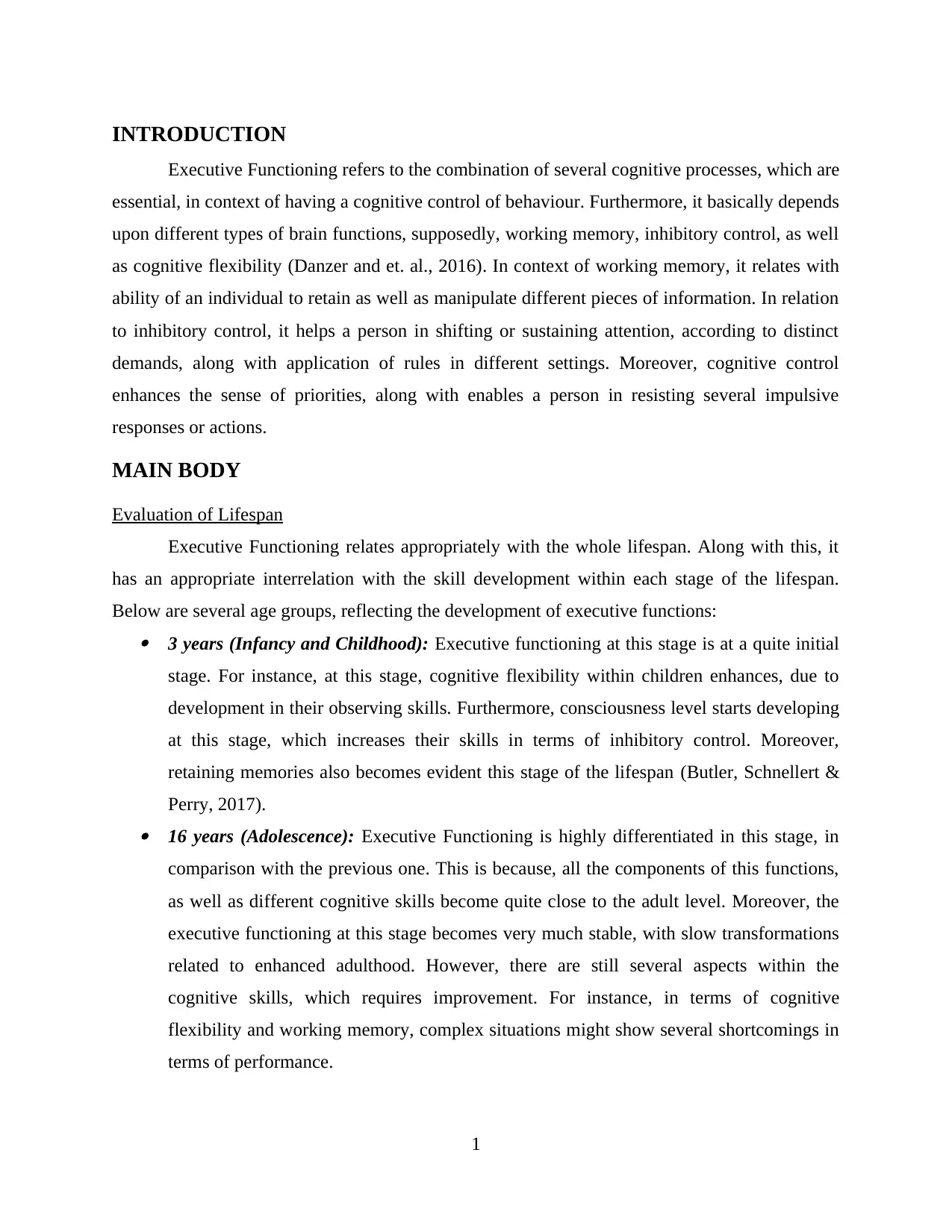
INTRODUCTION
Executive Functioning refers to the combination of several cognitive processes, which are
essential, in context of having a cognitive control of behaviour. Furthermore, it basically depends
upon different types of brain functions, supposedly, working memory, inhibitory control, as well
as cognitive flexibility (Danzer and et. al., 2016). In context of working memory, it relates with
ability of an individual to retain as well as manipulate different pieces of information. In relation
to inhibitory control, it helps a person in shifting or sustaining attention, according to distinct
demands, along with application of rules in different settings. Moreover, cognitive control
enhances the sense of priorities, along with enables a person in resisting several impulsive
responses or actions.
MAIN BODY
Evaluation of Lifespan
Executive Functioning relates appropriately with the whole lifespan. Along with this, it
has an appropriate interrelation with the skill development within each stage of the lifespan.
Below are several age groups, reflecting the development of executive functions: 3 years (Infancy and Childhood): Executive functioning at this stage is at a quite initial
stage. For instance, at this stage, cognitive flexibility within children enhances, due to
development in their observing skills. Furthermore, consciousness level starts developing
at this stage, which increases their skills in terms of inhibitory control. Moreover,
retaining memories also becomes evident this stage of the lifespan (Butler, Schnellert &
Perry, 2017). 16 years (Adolescence): Executive Functioning is highly differentiated in this stage, in
comparison with the previous one. This is because, all the components of this functions,
as well as different cognitive skills become quite close to the adult level. Moreover, the
executive functioning at this stage becomes very much stable, with slow transformations
related to enhanced adulthood. However, there are still several aspects within the
cognitive skills, which requires improvement. For instance, in terms of cognitive
flexibility and working memory, complex situations might show several shortcomings in
terms of performance.
1
Executive Functioning refers to the combination of several cognitive processes, which are
essential, in context of having a cognitive control of behaviour. Furthermore, it basically depends
upon different types of brain functions, supposedly, working memory, inhibitory control, as well
as cognitive flexibility (Danzer and et. al., 2016). In context of working memory, it relates with
ability of an individual to retain as well as manipulate different pieces of information. In relation
to inhibitory control, it helps a person in shifting or sustaining attention, according to distinct
demands, along with application of rules in different settings. Moreover, cognitive control
enhances the sense of priorities, along with enables a person in resisting several impulsive
responses or actions.
MAIN BODY
Evaluation of Lifespan
Executive Functioning relates appropriately with the whole lifespan. Along with this, it
has an appropriate interrelation with the skill development within each stage of the lifespan.
Below are several age groups, reflecting the development of executive functions: 3 years (Infancy and Childhood): Executive functioning at this stage is at a quite initial
stage. For instance, at this stage, cognitive flexibility within children enhances, due to
development in their observing skills. Furthermore, consciousness level starts developing
at this stage, which increases their skills in terms of inhibitory control. Moreover,
retaining memories also becomes evident this stage of the lifespan (Butler, Schnellert &
Perry, 2017). 16 years (Adolescence): Executive Functioning is highly differentiated in this stage, in
comparison with the previous one. This is because, all the components of this functions,
as well as different cognitive skills become quite close to the adult level. Moreover, the
executive functioning at this stage becomes very much stable, with slow transformations
related to enhanced adulthood. However, there are still several aspects within the
cognitive skills, which requires improvement. For instance, in terms of cognitive
flexibility and working memory, complex situations might show several shortcomings in
terms of performance.
1
⊘ This is a preview!⊘
Do you want full access?
Subscribe today to unlock all pages.

Trusted by 1+ million students worldwide
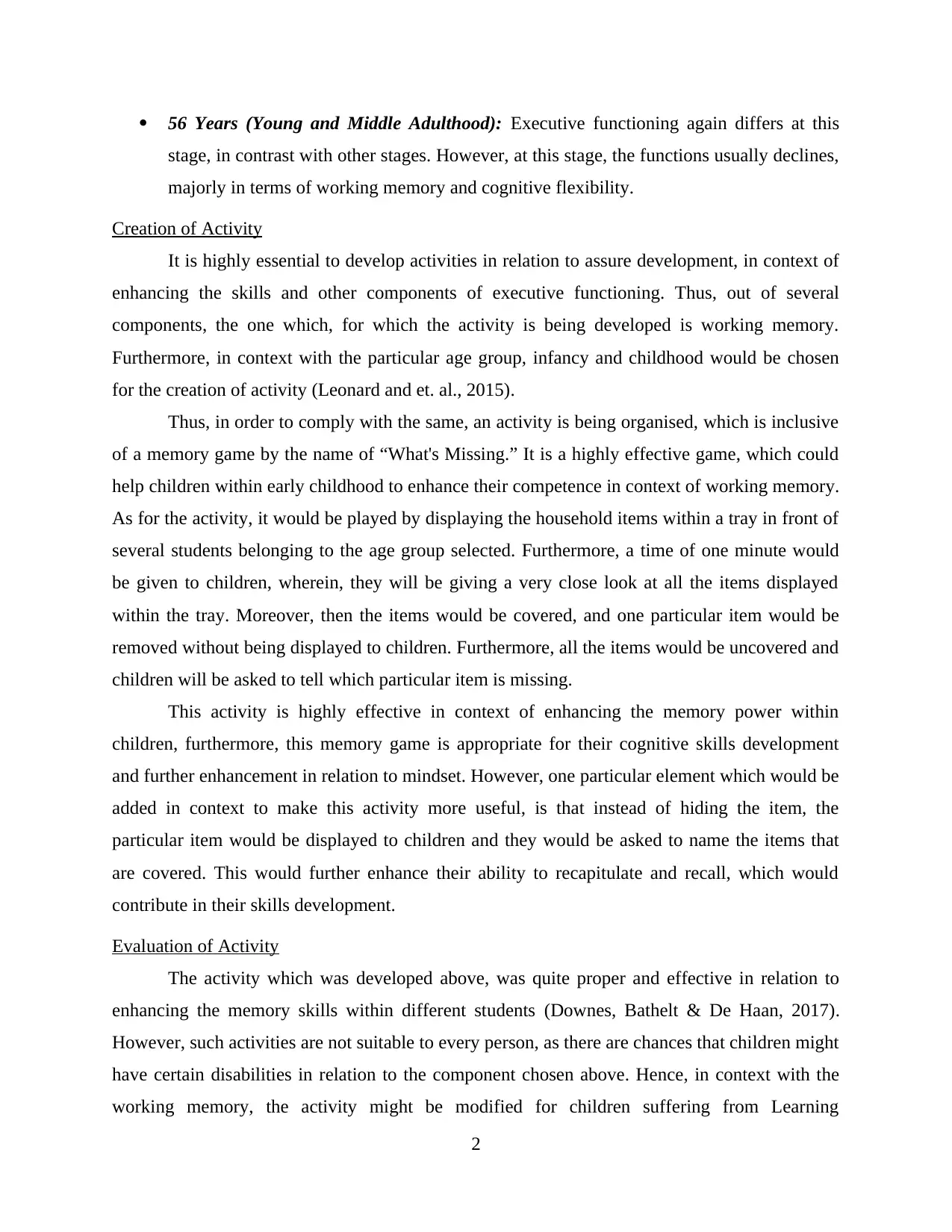
56 Years (Young and Middle Adulthood): Executive functioning again differs at this
stage, in contrast with other stages. However, at this stage, the functions usually declines,
majorly in terms of working memory and cognitive flexibility.
Creation of Activity
It is highly essential to develop activities in relation to assure development, in context of
enhancing the skills and other components of executive functioning. Thus, out of several
components, the one which, for which the activity is being developed is working memory.
Furthermore, in context with the particular age group, infancy and childhood would be chosen
for the creation of activity (Leonard and et. al., 2015).
Thus, in order to comply with the same, an activity is being organised, which is inclusive
of a memory game by the name of “What's Missing.” It is a highly effective game, which could
help children within early childhood to enhance their competence in context of working memory.
As for the activity, it would be played by displaying the household items within a tray in front of
several students belonging to the age group selected. Furthermore, a time of one minute would
be given to children, wherein, they will be giving a very close look at all the items displayed
within the tray. Moreover, then the items would be covered, and one particular item would be
removed without being displayed to children. Furthermore, all the items would be uncovered and
children will be asked to tell which particular item is missing.
This activity is highly effective in context of enhancing the memory power within
children, furthermore, this memory game is appropriate for their cognitive skills development
and further enhancement in relation to mindset. However, one particular element which would be
added in context to make this activity more useful, is that instead of hiding the item, the
particular item would be displayed to children and they would be asked to name the items that
are covered. This would further enhance their ability to recapitulate and recall, which would
contribute in their skills development.
Evaluation of Activity
The activity which was developed above, was quite proper and effective in relation to
enhancing the memory skills within different students (Downes, Bathelt & De Haan, 2017).
However, such activities are not suitable to every person, as there are chances that children might
have certain disabilities in relation to the component chosen above. Hence, in context with the
working memory, the activity might be modified for children suffering from Learning
2
stage, in contrast with other stages. However, at this stage, the functions usually declines,
majorly in terms of working memory and cognitive flexibility.
Creation of Activity
It is highly essential to develop activities in relation to assure development, in context of
enhancing the skills and other components of executive functioning. Thus, out of several
components, the one which, for which the activity is being developed is working memory.
Furthermore, in context with the particular age group, infancy and childhood would be chosen
for the creation of activity (Leonard and et. al., 2015).
Thus, in order to comply with the same, an activity is being organised, which is inclusive
of a memory game by the name of “What's Missing.” It is a highly effective game, which could
help children within early childhood to enhance their competence in context of working memory.
As for the activity, it would be played by displaying the household items within a tray in front of
several students belonging to the age group selected. Furthermore, a time of one minute would
be given to children, wherein, they will be giving a very close look at all the items displayed
within the tray. Moreover, then the items would be covered, and one particular item would be
removed without being displayed to children. Furthermore, all the items would be uncovered and
children will be asked to tell which particular item is missing.
This activity is highly effective in context of enhancing the memory power within
children, furthermore, this memory game is appropriate for their cognitive skills development
and further enhancement in relation to mindset. However, one particular element which would be
added in context to make this activity more useful, is that instead of hiding the item, the
particular item would be displayed to children and they would be asked to name the items that
are covered. This would further enhance their ability to recapitulate and recall, which would
contribute in their skills development.
Evaluation of Activity
The activity which was developed above, was quite proper and effective in relation to
enhancing the memory skills within different students (Downes, Bathelt & De Haan, 2017).
However, such activities are not suitable to every person, as there are chances that children might
have certain disabilities in relation to the component chosen above. Hence, in context with the
working memory, the activity might be modified for children suffering from Learning
2
Paraphrase This Document
Need a fresh take? Get an instant paraphrase of this document with our AI Paraphraser
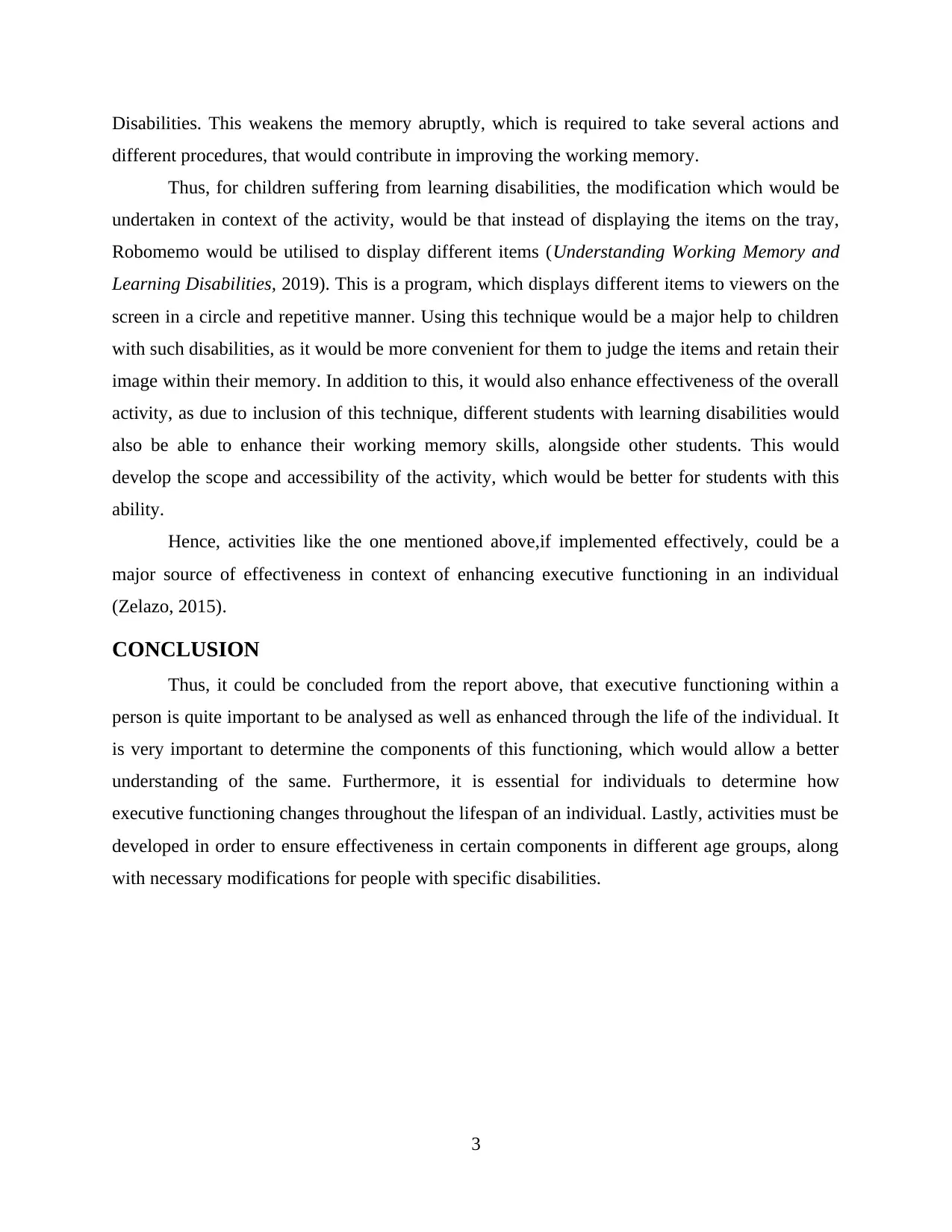
Disabilities. This weakens the memory abruptly, which is required to take several actions and
different procedures, that would contribute in improving the working memory.
Thus, for children suffering from learning disabilities, the modification which would be
undertaken in context of the activity, would be that instead of displaying the items on the tray,
Robomemo would be utilised to display different items (Understanding Working Memory and
Learning Disabilities, 2019). This is a program, which displays different items to viewers on the
screen in a circle and repetitive manner. Using this technique would be a major help to children
with such disabilities, as it would be more convenient for them to judge the items and retain their
image within their memory. In addition to this, it would also enhance effectiveness of the overall
activity, as due to inclusion of this technique, different students with learning disabilities would
also be able to enhance their working memory skills, alongside other students. This would
develop the scope and accessibility of the activity, which would be better for students with this
ability.
Hence, activities like the one mentioned above,if implemented effectively, could be a
major source of effectiveness in context of enhancing executive functioning in an individual
(Zelazo, 2015).
CONCLUSION
Thus, it could be concluded from the report above, that executive functioning within a
person is quite important to be analysed as well as enhanced through the life of the individual. It
is very important to determine the components of this functioning, which would allow a better
understanding of the same. Furthermore, it is essential for individuals to determine how
executive functioning changes throughout the lifespan of an individual. Lastly, activities must be
developed in order to ensure effectiveness in certain components in different age groups, along
with necessary modifications for people with specific disabilities.
3
different procedures, that would contribute in improving the working memory.
Thus, for children suffering from learning disabilities, the modification which would be
undertaken in context of the activity, would be that instead of displaying the items on the tray,
Robomemo would be utilised to display different items (Understanding Working Memory and
Learning Disabilities, 2019). This is a program, which displays different items to viewers on the
screen in a circle and repetitive manner. Using this technique would be a major help to children
with such disabilities, as it would be more convenient for them to judge the items and retain their
image within their memory. In addition to this, it would also enhance effectiveness of the overall
activity, as due to inclusion of this technique, different students with learning disabilities would
also be able to enhance their working memory skills, alongside other students. This would
develop the scope and accessibility of the activity, which would be better for students with this
ability.
Hence, activities like the one mentioned above,if implemented effectively, could be a
major source of effectiveness in context of enhancing executive functioning in an individual
(Zelazo, 2015).
CONCLUSION
Thus, it could be concluded from the report above, that executive functioning within a
person is quite important to be analysed as well as enhanced through the life of the individual. It
is very important to determine the components of this functioning, which would allow a better
understanding of the same. Furthermore, it is essential for individuals to determine how
executive functioning changes throughout the lifespan of an individual. Lastly, activities must be
developed in order to ensure effectiveness in certain components in different age groups, along
with necessary modifications for people with specific disabilities.
3
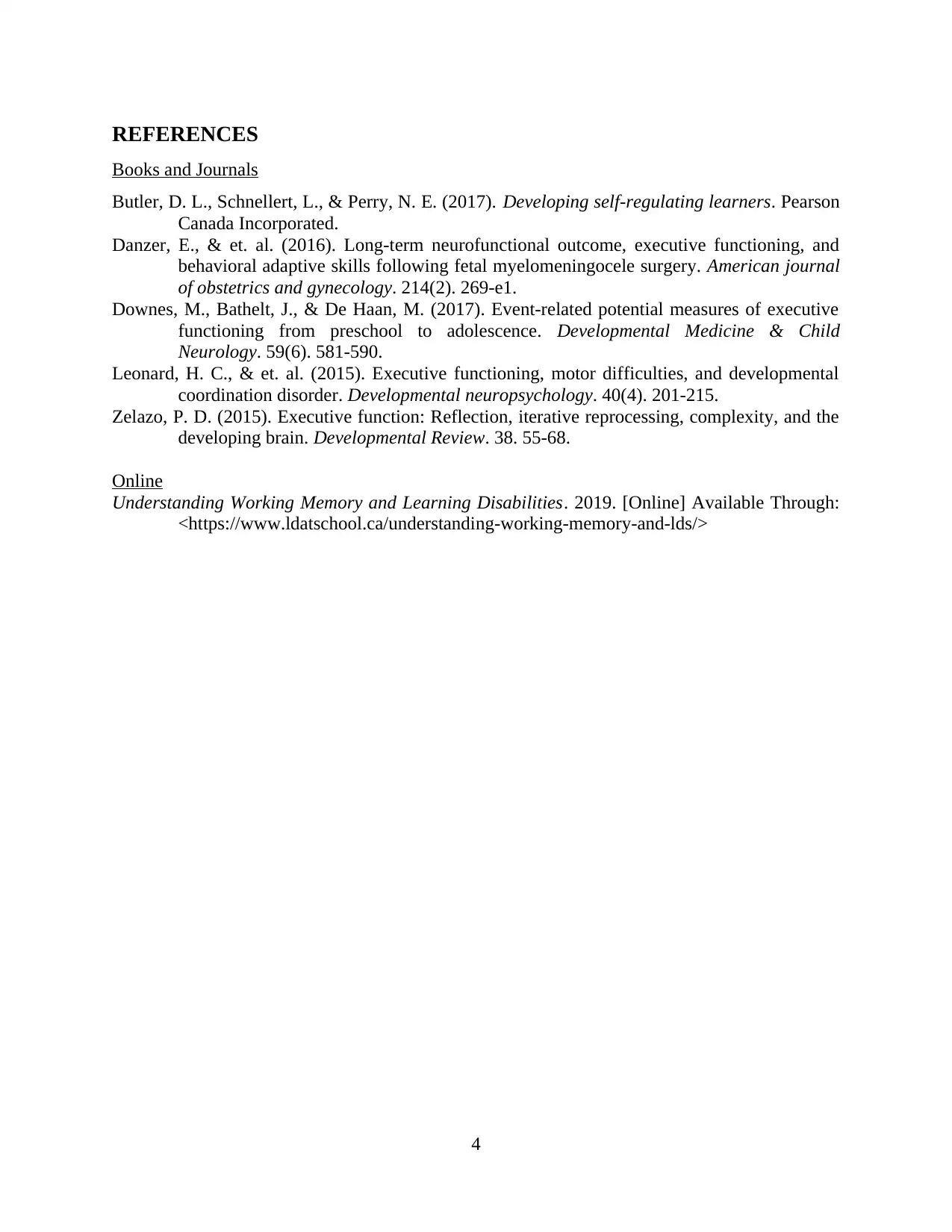
REFERENCES
Books and Journals
Butler, D. L., Schnellert, L., & Perry, N. E. (2017). Developing self-regulating learners. Pearson
Canada Incorporated.
Danzer, E., & et. al. (2016). Long-term neurofunctional outcome, executive functioning, and
behavioral adaptive skills following fetal myelomeningocele surgery. American journal
of obstetrics and gynecology. 214(2). 269-e1.
Downes, M., Bathelt, J., & De Haan, M. (2017). Event‐related potential measures of executive
functioning from preschool to adolescence. Developmental Medicine & Child
Neurology. 59(6). 581-590.
Leonard, H. C., & et. al. (2015). Executive functioning, motor difficulties, and developmental
coordination disorder. Developmental neuropsychology. 40(4). 201-215.
Zelazo, P. D. (2015). Executive function: Reflection, iterative reprocessing, complexity, and the
developing brain. Developmental Review. 38. 55-68.
Online
Understanding Working Memory and Learning Disabilities. 2019. [Online] Available Through:
<https://www.ldatschool.ca/understanding-working-memory-and-lds/>
4
Books and Journals
Butler, D. L., Schnellert, L., & Perry, N. E. (2017). Developing self-regulating learners. Pearson
Canada Incorporated.
Danzer, E., & et. al. (2016). Long-term neurofunctional outcome, executive functioning, and
behavioral adaptive skills following fetal myelomeningocele surgery. American journal
of obstetrics and gynecology. 214(2). 269-e1.
Downes, M., Bathelt, J., & De Haan, M. (2017). Event‐related potential measures of executive
functioning from preschool to adolescence. Developmental Medicine & Child
Neurology. 59(6). 581-590.
Leonard, H. C., & et. al. (2015). Executive functioning, motor difficulties, and developmental
coordination disorder. Developmental neuropsychology. 40(4). 201-215.
Zelazo, P. D. (2015). Executive function: Reflection, iterative reprocessing, complexity, and the
developing brain. Developmental Review. 38. 55-68.
Online
Understanding Working Memory and Learning Disabilities. 2019. [Online] Available Through:
<https://www.ldatschool.ca/understanding-working-memory-and-lds/>
4
⊘ This is a preview!⊘
Do you want full access?
Subscribe today to unlock all pages.

Trusted by 1+ million students worldwide
1 out of 6
Related Documents
Your All-in-One AI-Powered Toolkit for Academic Success.
+13062052269
info@desklib.com
Available 24*7 on WhatsApp / Email
![[object Object]](/_next/static/media/star-bottom.7253800d.svg)
Unlock your academic potential
Copyright © 2020–2026 A2Z Services. All Rights Reserved. Developed and managed by ZUCOL.





